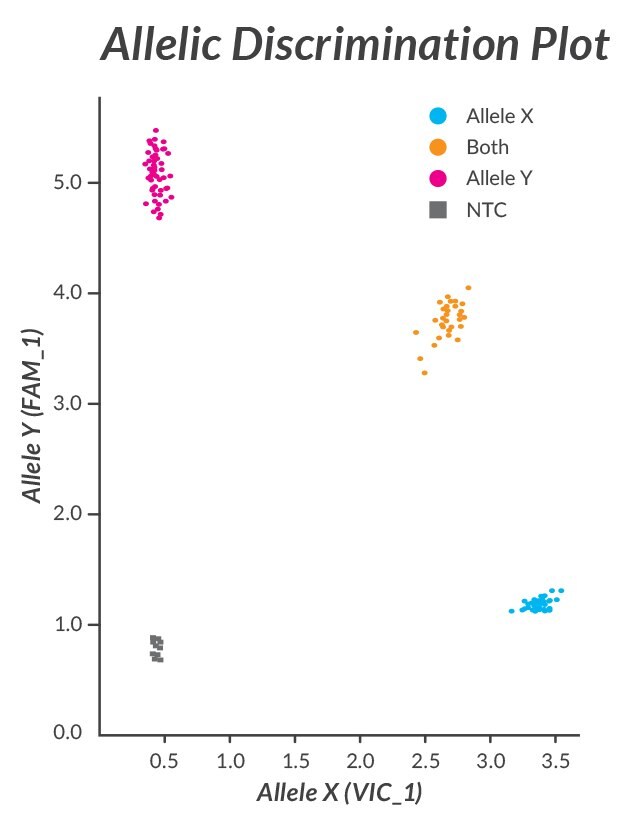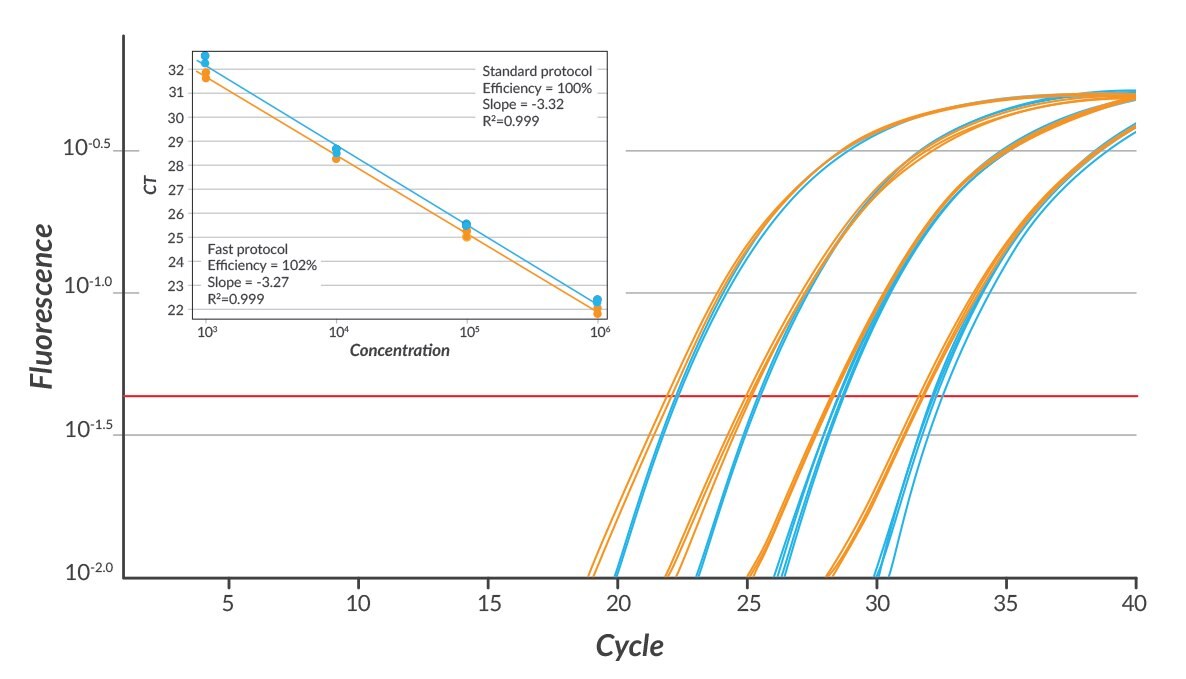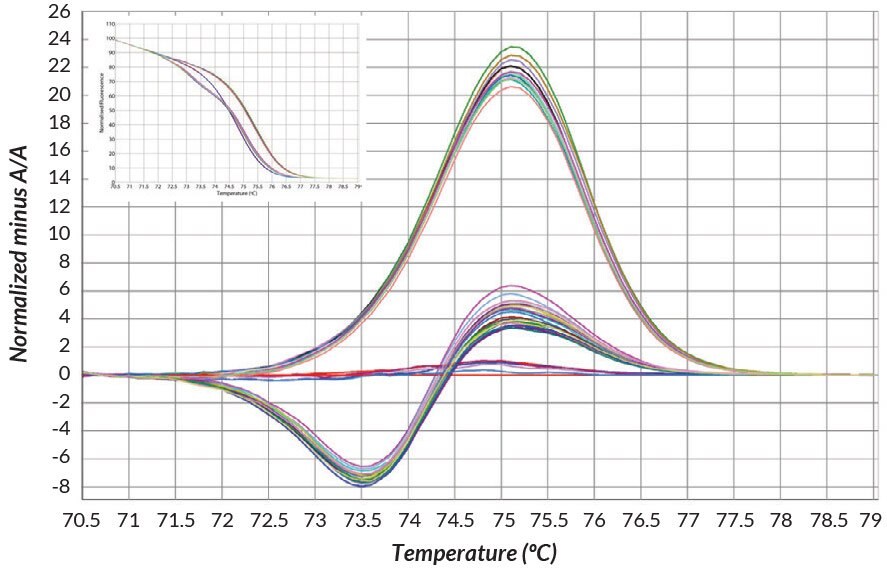Kapa Biosystems qPCR Reagents and Kits
Quantitative Real-Time PCR Kits and Reagents
Quantitative PCR (qPCR) and qRT-PCR reactions require reagents that are accurate and reliable. Kapa Biosystems qPCR and qRT-PCR reagents and kits are designed to provide consistent results for even the most challenging of templates and starting materials. Explore our Kapa Biosystems qPCR reagents and discover how you can improve the efficiency of your qPCR workflow and quantify your next breakthrough.
KAPA PROBE FAST
Precise, reproducible and versatile kits for all probe-based qPCR applications.
KAPA PROBE FAST qPCR kits provide fast and reproducible results for all probe-based qPCR applications. These kits contain a ready-to-use master mix for highly sensitive and accurate real-time PCR using sequence-specific fluorogenic probe chemistries, including hydrolysis probes (e.g., TaqMan®), FRET probes, and displacement probes (e.g., molecular beacons).
- Compatibility with probe-based qPCR applications and instruments
- Discrete clusters in SNP genotyping assays
- Broad dynamic range
- Highly stable master mix for high-throughput workflows
Achieve excellent reproducibility and efficiency
- Fast, high performance five-colored multiplex PCR
- Similar abundance levels achieved with low copy number
- Broad dynamic range of up to 10 orders of magnitude
Figure 1.Results for all 5 amplicons across a 5 point dilution series were obtained when assayed in penta-plex using a fast cycling protocol. Reaction volumes also included human genomic DNA (0.39 – 100 ng), 200 nM of each primer, and 200 nM of each hydrolysis probe (ACTB - FAM™/BHQ®-1, ERBB2 - CAL Fluor® Gold 540/ BHQ-1, ERBB3 - CAL Fluor Orange 560/ BHQ-2, EGFR - CAL Fluor Red 610/ BHQ-2, ACTG1 - Quasar® 705/ BHQ-2) using the following fast cycling protocol: 95 ºC for 3 min followed by 40 cycles of 95 ºC, 15 sec; 60 ºC, 15 sec.
Accurately discriminate between alleles
- Exceptional differentiation of heterozygous and homozygous alleles
- Discrete clusters in SNP genotyping assays

Figure 2.A total of 168 human genomic DNA samples were successfully genotyped along with 24 no-template controls using an ATP1B3 SNP genotyping assay on the ABI 7900HT real-time PCR system. Reaction volumes also included human genomic DNA (10 ng), 200 nM of each primer, and 200 nM of each hydrolysis probe (Allele X – FAM/ BHQ®-1, Allele Y – VIC/ BHQ-1) using the following standard cycling protocol: 95ºC for 10 min followed by 40 cycles of 95ºC, 15 sec; 60ºC, 60 sec.
Increase flexibility
- Compatible with both standard and fast cycling protocols
- Retain accurate quantification

Figure 3.Amplification plots were generated using either a standard cycling protocol (95ºC for 10 min followed by 40 cycles of 95ºC, 15 sec; 60ºC, 60 sec) or a fast cycling protocol: 95ºC for 3 min followed by 40 cycles of 95 ºC, 3 sec; 60 ºC, 20 sec. Reaction volumes also included human genomic DNA (10-fold dilutions over a 0.1 ng – 100 ng per reaction range), 200 nM of each primer, and 200 nM of hApoB100 (FAM/BHQ-1) hydrolysis probe.
KAPA PROBE FORCE
KAPA PROBE FORCE is our most inhibitor–resistant qPCR master mix that removes the need for DNA purification, enabling streamlined sample-to-Cq workflows. The master mix contains a third generation DNA polymerase evolved to overcome blood, tissue, and plant PCR inhibitors. Analyze crude samples that have comparable accuracy, reproducibility and sensitivity as samples derived of purified DNA.
- KAPA PROBE FORCE provides:
- Direct qPCR from crude blood, tissue, and plant extracts
- Sample-to-Cq workflows in <1 hour
- High efficiency for accurate, reproducible, and sensitive results
- Superior tolerance to carry-over inhibitors
- Multiplex compatibility with crude extracts
Streamline Sample-to-Cq Workflows
KAPA PROBE FORCE enables the use of rapid crude DNA extraction methods and overcomes carryover inhibitors. Competing master mixes used in traditional blood, tissue, and plant qPCR workflows require robust upstream sample processing (e.g., column purification or nuclease digestion).
- Eliminate the time and cost of sample purification by amplifying directly from crude samples
- Analyze a wide range of sample types including whole blood, cells, mouse tails, FFPE, leaf, stem, seed, and soil

Generate accurate and reproducible results
- Kits include a third-generation DNA polymerase, evolved for robust target amplification and detection
- Enzyme maintains high reaction efficiency in the presence of PCR inhibitors for reliable data generation

Figure 5. High efficiency target amplification.Reaction efficiencies achieved for inhibitor-spiked samples were examined and compared to that of purified DNA. Across various inhibitor types, efficiencies remained within 90 – 110%.
Break through high Levels of qPCR Inhibitors
KAPA PROBE FORCE exhibits consistent and robust amplification across all inhibitors tested, without observable Cq delays.
- Achieve greater levels of sensitivity for inhibited blood, tissue, and plant samples
- Convert purified DNA assays to crude workflows without a loss in data quality

Figure 6. Broad range of high inhibitor resistance.Baseline performance of KAPA PROBE FORCE and competing master mixes was measured by creating standard curves with purified DNA according to each manufacturer’s recommended cycling conditions. Serial dilutions were run in the following ranges: Human: 100 ng – 10 pg; Mouse: 100 ng – 10 pg; Plant: 25 ng – 8 pg; and Bacteria: 2 ng – 2 fg. Inhibitors were individually spiked into purified DNA samples at high concentrations to determine their effect on Cq values.
Multiplex crude samples efficiently
- Accelerate genotyping analysis with single reaction allelic discrimination of crude DNA extracts
- Maximize data collection from precious samples, increase throughput, and reduce costs

Figure 7. Cru5e sample duplex SNP detection.KAPA PROBE FORCE provides accurate genotyping and tight clustering in the presence of crude extracts (A) cotton seed, 0.5M NaOH extraction; (B) grapevine leaf, 75 mM Tris-HCl and 5 mM TCEP extraction; (C) mouse blood, FTA 0.5 mm disc; and (D) mouse tail extracts, NaOH extraction, for rapid SNP analysis.

Figure 8. Highly efficient 4-plex performance.Four targets were amplified in a multiplex assay with KAPA PROBE FORCE and three competitive master mixes. 100 pg mouse gDNA was amplified targeting the (A) Isg20 (FAM/BHQ-1), (B) F13a1 (CAL Fluor Orange 560), (C) Camta1 (Quasar 670) and (D) Ube20 (Quasar 705) genes. 500 nM primers and 110 nM probes were used with the following cycling conditions: 95 °C for 30 sec followed by 50 cycles of 95 °C for 3 sec, and 60 °C for 30 sec.
KAPA SYBR® FAST One-Step qRT-PCR Kits
KAPA SYBR® FAST One-Step qRT-PCR kits are designed for optimal performance in stringent qRT-PCR reaction conditions, exhibiting dramatic improvements in sensitivity, specificity, reaction efficiency, and fluorescence. The kit is optimized for rapid one-step, one-tube RNA quantification, reducing experimental variation and contamination with a convenient qRT-PCR protocol. The kits contain M-MuLV reverse transcriptase, RNase inhibitor, and a novel DNA polymerase evolved via directed evolution.
KAPA SYBR® FAST One-Step qRT-PCR kits are suitable for a variety of applications and include:
- SNP genotyping
- Gene expression analysis
- Microarray validation
- Gene knockdown validation
- RNAi and miRNA research
Increase signal and reaction efficiency
- Consistently higher amplification efficiencies for accurate qPCR
- Higher fluorescence, earlier Cq values and improved reaction efficiencies

Figure 9. RRMI gene(94 bp, 45.7% GC) amplified from 10-fold dilution series of RNA (100 ng to 10 pg per 20 μL reaction) isolated from human placenta. KAPA SYBR® FAST One-Step qRT-PCR Kit demonstrates earlier Cq values, higher fluorescence, and optimal reaction efficiencies.
Amplify across a broad range of target lengths
- Robust performance independent of amplicon size
MS2 bacteriophage RNA targets of increasing length were amplified at 0.8 pg per 20 μL reaction. KAPA SYBR® FAST One-Step qRT-PCR Kit maintained high performance across all amplicon lengths.
Improve sensitivity and reproducibility
- Accurate interrogation across a wide range of RNA template concentrations

Figure 11.279 bp fragment amplified in replicates of 6 from a 10-fold dilution series of commercial MS2 bacteriophage RNA (80 pg to 0.8 fg per 20 μL reaction). Reaction efficiency of 95% calculated for all 6 replicates per data.
For more information, view the KAPA SYBR® FAST One-Step qRT-PCR Kits FAQs.
KAPA HRM FAST
Accurate Detection of DNA Sequence Variations
High Resolution Melt (HRM) analysis is a technique for fast, high-throughput post-PCR analysis of genetic mutations or variance in nucleic acid sequences. The KAPA HRM FAST Master Mix contains a novel DNA polymerase and buffer system along with the EvaGreen® saturating dye, which is optimized for maximum discrimination between sequence variants.
KAPA HRM FAST kits provide:
- SNP genotyping
- Mutation discovery (gene scanning)
- Screening for heterozygosity
- DNA fingerprinting
- DNA methylation analysis
Accurately Detect Type IV SNPs
- 95% detection levels, even when competitors fail*
- Reduced reaction times

Figure 12.*A) The Type IV SNP rs641805 is located on an intron of the dihydropyrimidine dehydrogenase (DPD) gene. Reactions also included 2.5 mM MgCl2, 0.2 μM of each primer and 10 ng of human genomic DNA. PCR and HRM was performed using a fast, 2-step cycling protocol (40 cycles) with 5 sec denaturation (95 °C) and 20 sec annealing/extension (60 °C).
*B) The Type IV SNP rs641805 is located on an intron of the dihydropyrimidine dehydrogenase (DPD) gene. Reactions also included 2.5 mM MgCl2, 0.2 μM of each primer and 10 ng of human genomic DNA. PCR and HRM was performed using a fast, 2-step cycling protocol (40 cycles) with 5 sec denaturation (95 °C) and 20 sec annealing/extension (60 °C). The ABI MeltDoctor HRM Master Mix was used according to the manufacturer’s instructions, with the same template DNA samples.
Maximize differences in sequence variants
- Engineered to maximize differences in melting behavior
- Improved sensitivity

Maximize differences in sequence variants
- Engineered to maximize differences in melting behavior
- Improved sensitivity
Quickly go from cell to SNP
- Enables extraction, amplification and HRM in less than 2 hours when used in combination with the KAPA Express Extract Kit

Figure 14.DNA extracts were prepared from buccal swabs obtained from 36 individuals using KAPA Express Extract DNA Extraction Kits (according to recommended protocols). DNA extracts were used directly in reactions also containing 2.5 mM MgCl2 and 0.2 μM of each primer. PCR and HRM was performed using a fast, 2-step cycling protocol (45 cycles) with 5 sec denaturation (95 °C) and 30 sec annealing/extension (60 °C).
Pour continuer à lire, veuillez vous connecter à votre compte ou en créer un.
Vous n'avez pas de compte ?